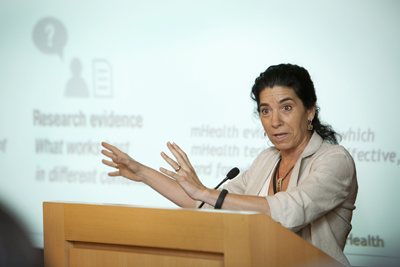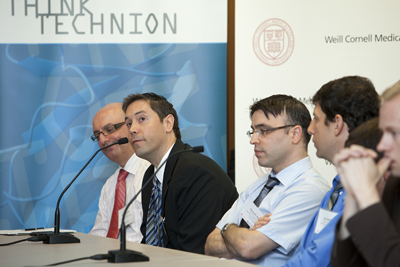Healthier Life hub discussed at NYC workshop
By Alyssa Sunkin


The research enterprise at the CornellNYC Tech campus has taken a major step forward, with key stakeholders beginning to shape the school's focus on fostering technologies to promote a healthier life.
Along with industry experts, researchers and leaders from the Technion -- Israel Institute of Technology, Cornell in Ithaca and Weill Cornell Medical College gathered at the medical school campus in Manhattan July 26-27 to share research ideas that will help shape the Healthier Life hub. The hub is one of three themes around which the new tech campus is focused.
"One of the objectives of this workshop is to bring together all the people involved to figure out what are the main challenges and problems in this field that have to be solved," said Craig Gotsman, director of the Technion-Cornell Innovation Institute, which is a key part of the tech campus. "If we want this campus to have an impact -- a real effect on the world -- we have to figure this out."
Effective technologies for patient-centered health care, medical devices and mobile health, sensor-enabled smartphones, improved electronic medical records, and human implanted and biomorphic electronic chips were just a handful of ideas voiced at the workshop. The hub promotes a natural collaboration between Weill Cornell and Technion's medical school, in addition to the main Cornell campus in Ithaca, and the main Technion campus in Haifa.
"When we started working on the Healthier Life hub, it very quickly became obvious that the medical schools from both Technion and Cornell must be involved," Gotsman said.
Similar workshops on the other two hubs -- Built Environment, which concentrates on architecture and urban planning, and Connective Media, with ties to a broad range of industries such as advertising and media -- will take place in the fall at CornellNYC Tech's temporary Chelsea campus. The campus will move to its permanent home on Roosevelt Island in five years.
"We have this question in front of us, which is: If you were to create a new campus in the middle of the river just east of here that had a big part focused on healthier living, what part of that big, broad area would you put on that campus?" said Cornell Provost Kent Fuchs to a packed house at Weill Cornell's Uris Auditorium.
"One of the most exciting components of the Cornell/Technion proposal was the innovative, industry-linked curriculum 'hubs' that are being developed, starting with today's joint workshop on Healthier Life," said New York Deputy Mayor Robert K. Steel. "The momentum and progress that Cornell and the Technion are making toward bringing Mayor Bloomberg's vision to reality is exciting and undeniable."
It is also essential. There's no question, said Dr. Laurie Glimcher, the Stephen and Suzanne Weiss Dean of Weill Cornell Medical College, that the nation's health care system is in crisis, and CornellNYC Tech may generate solutions to those problems.
"We need to make it clear to the citizens of this country and the leaders of this country how vital biomedical research and applied sciences and technology research is to dealing with our health care problems," Glimcher said. "I think we are only going to fix our health care problems, health care costs, and health care effectiveness when we find new discoveries that prevent, treat or cure disease. I can't think of a more powerful group coming together to solve that problem."
It's been seven months since Cornell and the Technion -- considered the driving force behind Israel's emergence as one of the world's technology centers -- won a competitive bid to build the campus through the Applied Sciences NYC Initiative. The initiative is Mayor Michael Bloomberg's vision for enticing world-class institutions to set up shop in New York City and serve as magnets for talent, innovation and growth in entrepreneurship and engineering.
One of the goals of Cornell's New York City tech campus is to forge an unprecedented paradigm of collaboration between academia and industry that will help fashion New York into the high-tech capital of the world. By the time the campus is complete, it will comprise approximately 2 million square feet of space in highly sustainable buildings and will offer significant public open spaces.
At full build, the new campus is expected to enroll approximately 2,000 students in master's and doctoral programs, offering Cornell degrees as well an innovative dual master's degree from Cornell and the Technion.
Alyssa Sunkin is a writer in the Office of Public Affairs of NewYork-Presbyterian/Weill Cornell.
Media Contact
Get Cornell news delivered right to your inbox.
Subscribe